Analysis of Mathena vs. Malvo Case Decision by Supreme Court Justice
VerifiedAdded on 2022/09/16
|5
|1021
|27
Report
AI Summary
This report analyzes the Supreme Court case of Mathena vs. Malvo, focusing on the decision-making process of a Supreme Court Justice. The case involves Lee Malvo, who was involved in the 2002 sniper attacks, and the legal challenges to his life sentences based on the Miller vs. Alabama and Montgomery vs. Louisiana rulings. The report discusses the Eighth Amendment's implications on juvenile sentencing, highlighting the differences between juvenile and adult justice systems. The author, as a hypothetical Supreme Court Justice, would rule in favor of Malvo, emphasizing the unconstitutionality of life sentences without parole for juveniles. The report references key legal precedents and the evolving understanding of juvenile culpability within the justice system.
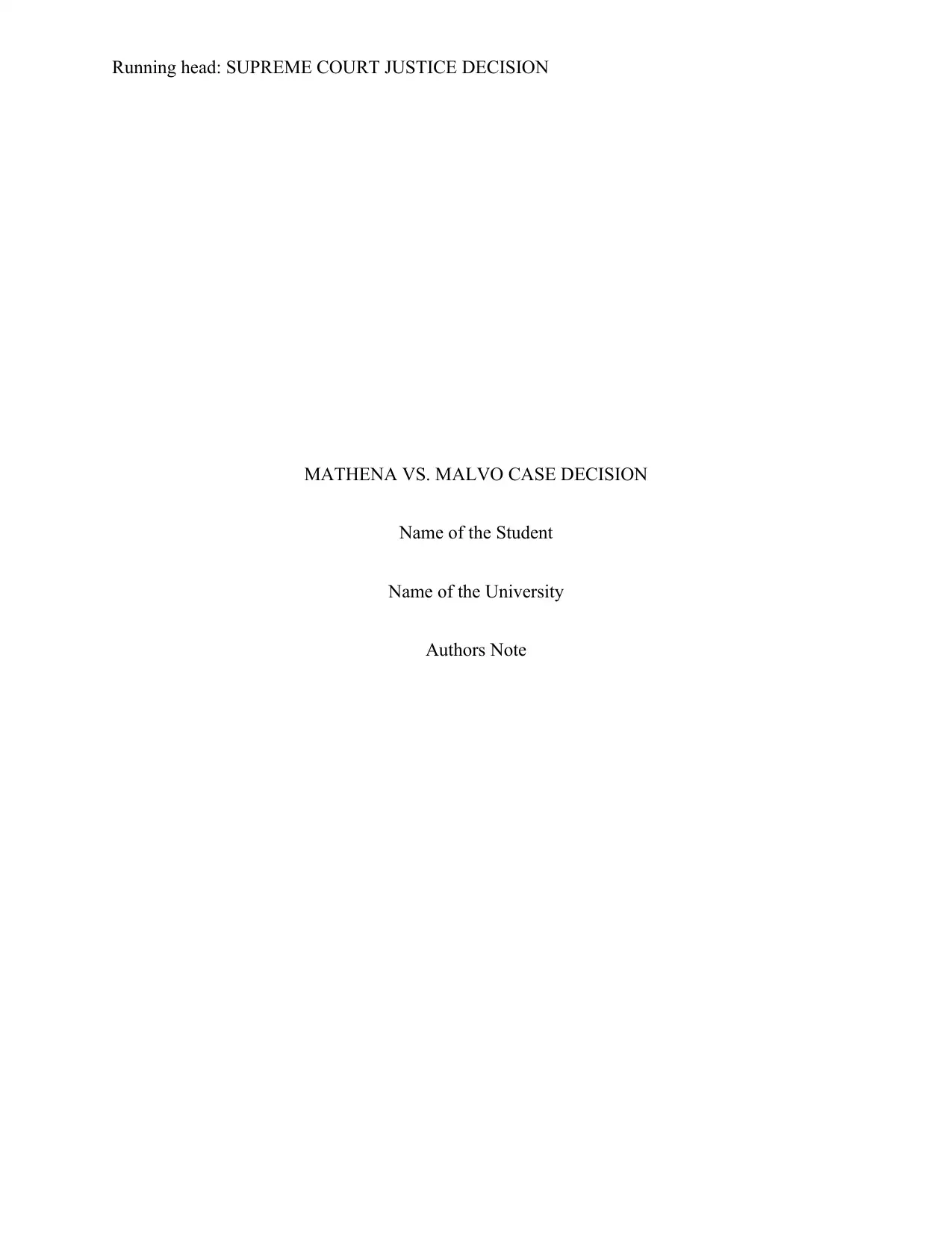
Running head: SUPREME COURT JUSTICE DECISION
MATHENA VS. MALVO CASE DECISION
Name of the Student
Name of the University
Authors Note
MATHENA VS. MALVO CASE DECISION
Name of the Student
Name of the University
Authors Note
Paraphrase This Document
Need a fresh take? Get an instant paraphrase of this document with our AI Paraphraser
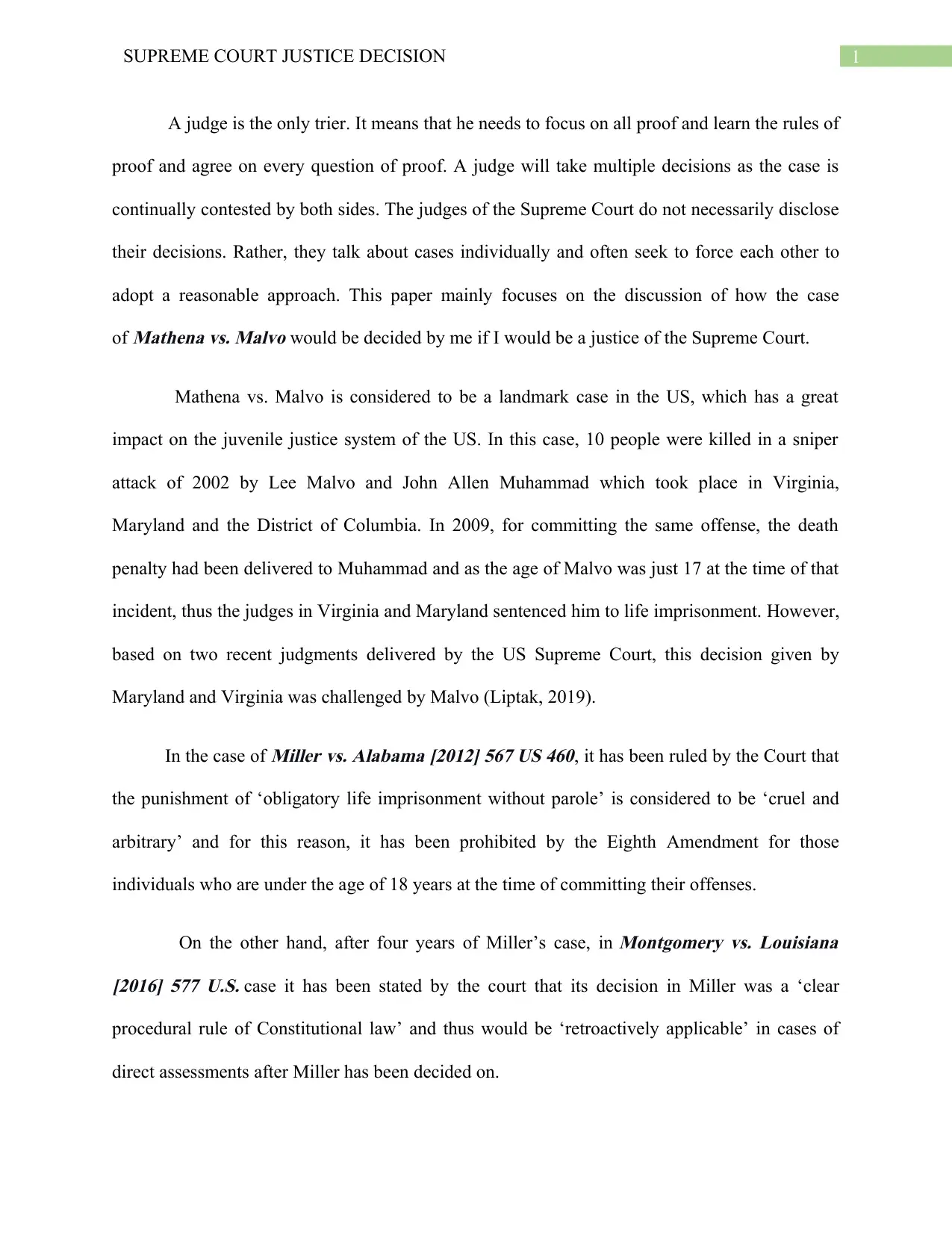
1SUPREME COURT JUSTICE DECISION
A judge is the only trier. It means that he needs to focus on all proof and learn the rules of
proof and agree on every question of proof. A judge will take multiple decisions as the case is
continually contested by both sides. The judges of the Supreme Court do not necessarily disclose
their decisions. Rather, they talk about cases individually and often seek to force each other to
adopt a reasonable approach. This paper mainly focuses on the discussion of how the case
of
Mathena vs. Malvo would be decided by me if I would be a justice of the Supreme Court.
Mathena vs. Malvo is considered to be a landmark case in the US, which has a great
impact on the juvenile justice system of the US. In this case, 10 people were killed in a sniper
attack of 2002 by Lee Malvo and John Allen Muhammad which took place in Virginia,
Maryland and the District of Columbia. In 2009, for committing the same offense, the death
penalty had been delivered to Muhammad and as the age of Malvo was just 17 at the time of that
incident, thus the judges in Virginia and Maryland sentenced him to life imprisonment. However,
based on two recent judgments delivered by the US Supreme Court, this decision given by
Maryland and Virginia was challenged by Malvo (Liptak, 2019).
In the case of
Miller vs. Alabama [2012] 567 US 460, it has been ruled by the Court that
the punishment of ‘obligatory life imprisonment without parole’ is considered to be ‘cruel and
arbitrary’ and for this reason, it has been prohibited by the Eighth Amendment for those
individuals who are under the age of 18 years at the time of committing their offenses.
On the other hand, after four years of Miller’s case, in
Montgomery vs. Louisiana
[2016] 577 U.S. case it has been stated by the court that its decision in Miller was a ‘clear
procedural rule of Constitutional law’ and thus would be ‘retroactively applicable’ in cases of
direct assessments after Miller has been decided on.
A judge is the only trier. It means that he needs to focus on all proof and learn the rules of
proof and agree on every question of proof. A judge will take multiple decisions as the case is
continually contested by both sides. The judges of the Supreme Court do not necessarily disclose
their decisions. Rather, they talk about cases individually and often seek to force each other to
adopt a reasonable approach. This paper mainly focuses on the discussion of how the case
of
Mathena vs. Malvo would be decided by me if I would be a justice of the Supreme Court.
Mathena vs. Malvo is considered to be a landmark case in the US, which has a great
impact on the juvenile justice system of the US. In this case, 10 people were killed in a sniper
attack of 2002 by Lee Malvo and John Allen Muhammad which took place in Virginia,
Maryland and the District of Columbia. In 2009, for committing the same offense, the death
penalty had been delivered to Muhammad and as the age of Malvo was just 17 at the time of that
incident, thus the judges in Virginia and Maryland sentenced him to life imprisonment. However,
based on two recent judgments delivered by the US Supreme Court, this decision given by
Maryland and Virginia was challenged by Malvo (Liptak, 2019).
In the case of
Miller vs. Alabama [2012] 567 US 460, it has been ruled by the Court that
the punishment of ‘obligatory life imprisonment without parole’ is considered to be ‘cruel and
arbitrary’ and for this reason, it has been prohibited by the Eighth Amendment for those
individuals who are under the age of 18 years at the time of committing their offenses.
On the other hand, after four years of Miller’s case, in
Montgomery vs. Louisiana
[2016] 577 U.S. case it has been stated by the court that its decision in Miller was a ‘clear
procedural rule of Constitutional law’ and thus would be ‘retroactively applicable’ in cases of
direct assessments after Miller has been decided on.
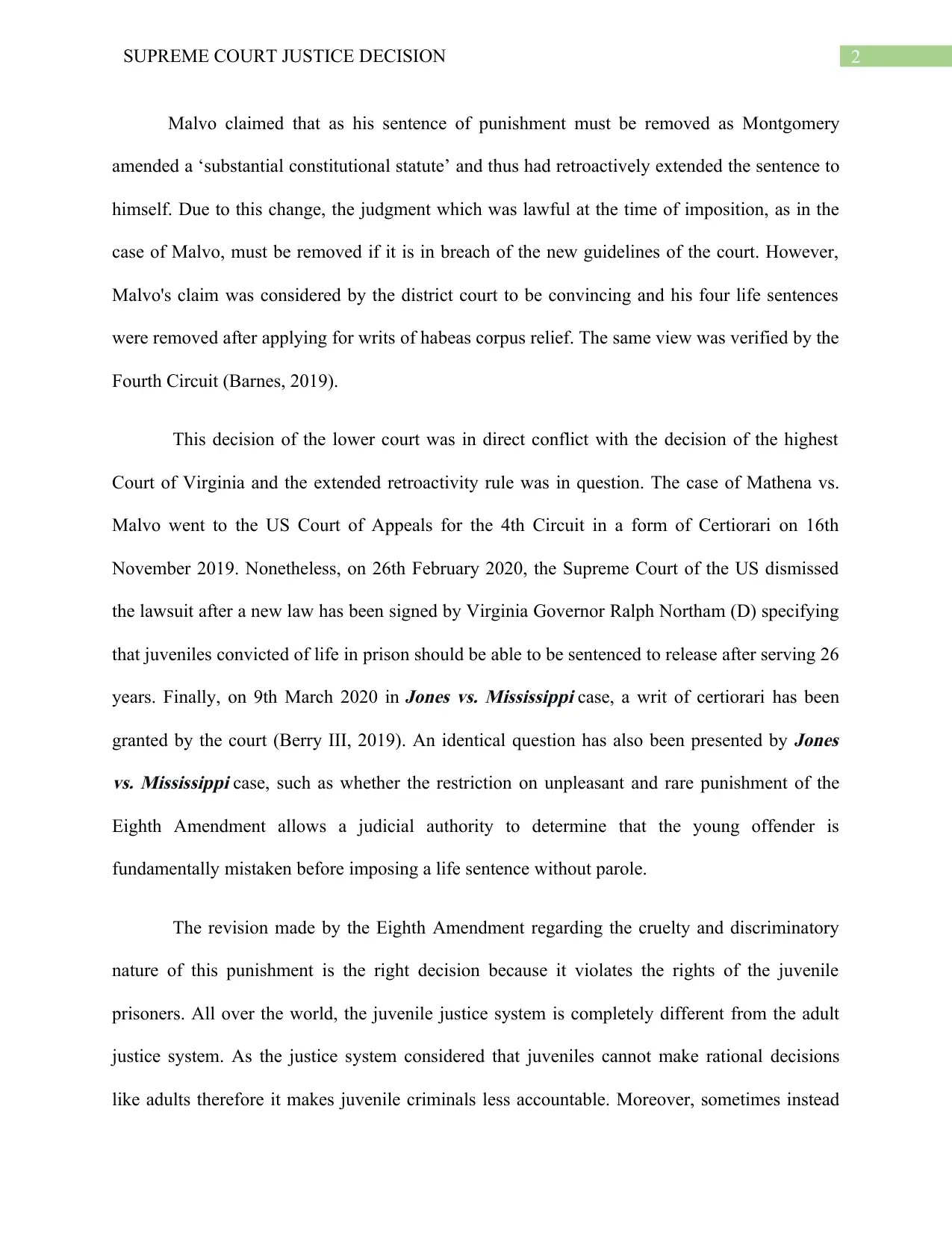
2SUPREME COURT JUSTICE DECISION
Malvo claimed that as his sentence of punishment must be removed as Montgomery
amended a ‘substantial constitutional statute’ and thus had retroactively extended the sentence to
himself. Due to this change, the judgment which was lawful at the time of imposition, as in the
case of Malvo, must be removed if it is in breach of the new guidelines of the court. However,
Malvo's claim was considered by the district court to be convincing and his four life sentences
were removed after applying for writs of habeas corpus relief. The same view was verified by the
Fourth Circuit (Barnes, 2019).
This decision of the lower court was in direct conflict with the decision of the highest
Court of Virginia and the extended retroactivity rule was in question. The case of Mathena vs.
Malvo went to the US Court of Appeals for the 4th Circuit in a form of Certiorari on 16th
November 2019. Nonetheless, on 26th February 2020, the Supreme Court of the US dismissed
the lawsuit after a new law has been signed by Virginia Governor Ralph Northam (D) specifying
that juveniles convicted of life in prison should be able to be sentenced to release after serving 26
years. Finally, on 9th March 2020 in
Jones vs. Mississippi case, a writ of certiorari has been
granted by the court (Berry III, 2019). An identical question has also been presented by
Jones
vs. Mississippi case, such as whether the restriction on unpleasant and rare punishment of the
Eighth Amendment allows a judicial authority to determine that the young offender is
fundamentally mistaken before imposing a life sentence without parole.
The revision made by the Eighth Amendment regarding the cruelty and discriminatory
nature of this punishment is the right decision because it violates the rights of the juvenile
prisoners. All over the world, the juvenile justice system is completely different from the adult
justice system. As the justice system considered that juveniles cannot make rational decisions
like adults therefore it makes juvenile criminals less accountable. Moreover, sometimes instead
Malvo claimed that as his sentence of punishment must be removed as Montgomery
amended a ‘substantial constitutional statute’ and thus had retroactively extended the sentence to
himself. Due to this change, the judgment which was lawful at the time of imposition, as in the
case of Malvo, must be removed if it is in breach of the new guidelines of the court. However,
Malvo's claim was considered by the district court to be convincing and his four life sentences
were removed after applying for writs of habeas corpus relief. The same view was verified by the
Fourth Circuit (Barnes, 2019).
This decision of the lower court was in direct conflict with the decision of the highest
Court of Virginia and the extended retroactivity rule was in question. The case of Mathena vs.
Malvo went to the US Court of Appeals for the 4th Circuit in a form of Certiorari on 16th
November 2019. Nonetheless, on 26th February 2020, the Supreme Court of the US dismissed
the lawsuit after a new law has been signed by Virginia Governor Ralph Northam (D) specifying
that juveniles convicted of life in prison should be able to be sentenced to release after serving 26
years. Finally, on 9th March 2020 in
Jones vs. Mississippi case, a writ of certiorari has been
granted by the court (Berry III, 2019). An identical question has also been presented by
Jones
vs. Mississippi case, such as whether the restriction on unpleasant and rare punishment of the
Eighth Amendment allows a judicial authority to determine that the young offender is
fundamentally mistaken before imposing a life sentence without parole.
The revision made by the Eighth Amendment regarding the cruelty and discriminatory
nature of this punishment is the right decision because it violates the rights of the juvenile
prisoners. All over the world, the juvenile justice system is completely different from the adult
justice system. As the justice system considered that juveniles cannot make rational decisions
like adults therefore it makes juvenile criminals less accountable. Moreover, sometimes instead
⊘ This is a preview!⊘
Do you want full access?
Subscribe today to unlock all pages.

Trusted by 1+ million students worldwide
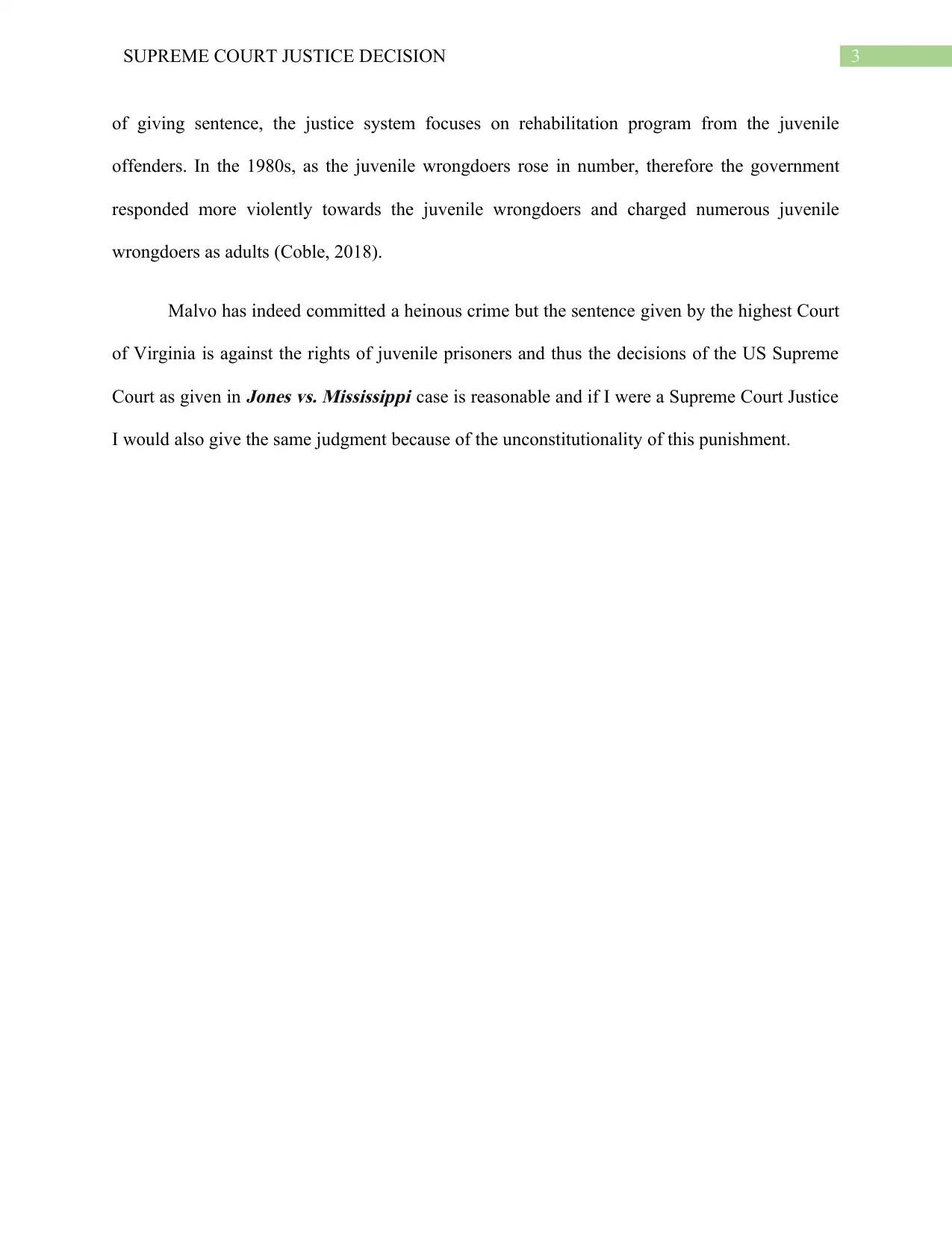
3SUPREME COURT JUSTICE DECISION
of giving sentence, the justice system focuses on rehabilitation program from the juvenile
offenders. In the 1980s, as the juvenile wrongdoers rose in number, therefore the government
responded more violently towards the juvenile wrongdoers and charged numerous juvenile
wrongdoers as adults (Coble, 2018).
Malvo has indeed committed a heinous crime but the sentence given by the highest Court
of Virginia is against the rights of juvenile prisoners and thus the decisions of the US Supreme
Court as given in
Jones vs. Mississippi case is reasonable and if I were a Supreme Court Justice
I would also give the same judgment because of the unconstitutionality of this punishment.
of giving sentence, the justice system focuses on rehabilitation program from the juvenile
offenders. In the 1980s, as the juvenile wrongdoers rose in number, therefore the government
responded more violently towards the juvenile wrongdoers and charged numerous juvenile
wrongdoers as adults (Coble, 2018).
Malvo has indeed committed a heinous crime but the sentence given by the highest Court
of Virginia is against the rights of juvenile prisoners and thus the decisions of the US Supreme
Court as given in
Jones vs. Mississippi case is reasonable and if I were a Supreme Court Justice
I would also give the same judgment because of the unconstitutionality of this punishment.
Paraphrase This Document
Need a fresh take? Get an instant paraphrase of this document with our AI Paraphraser
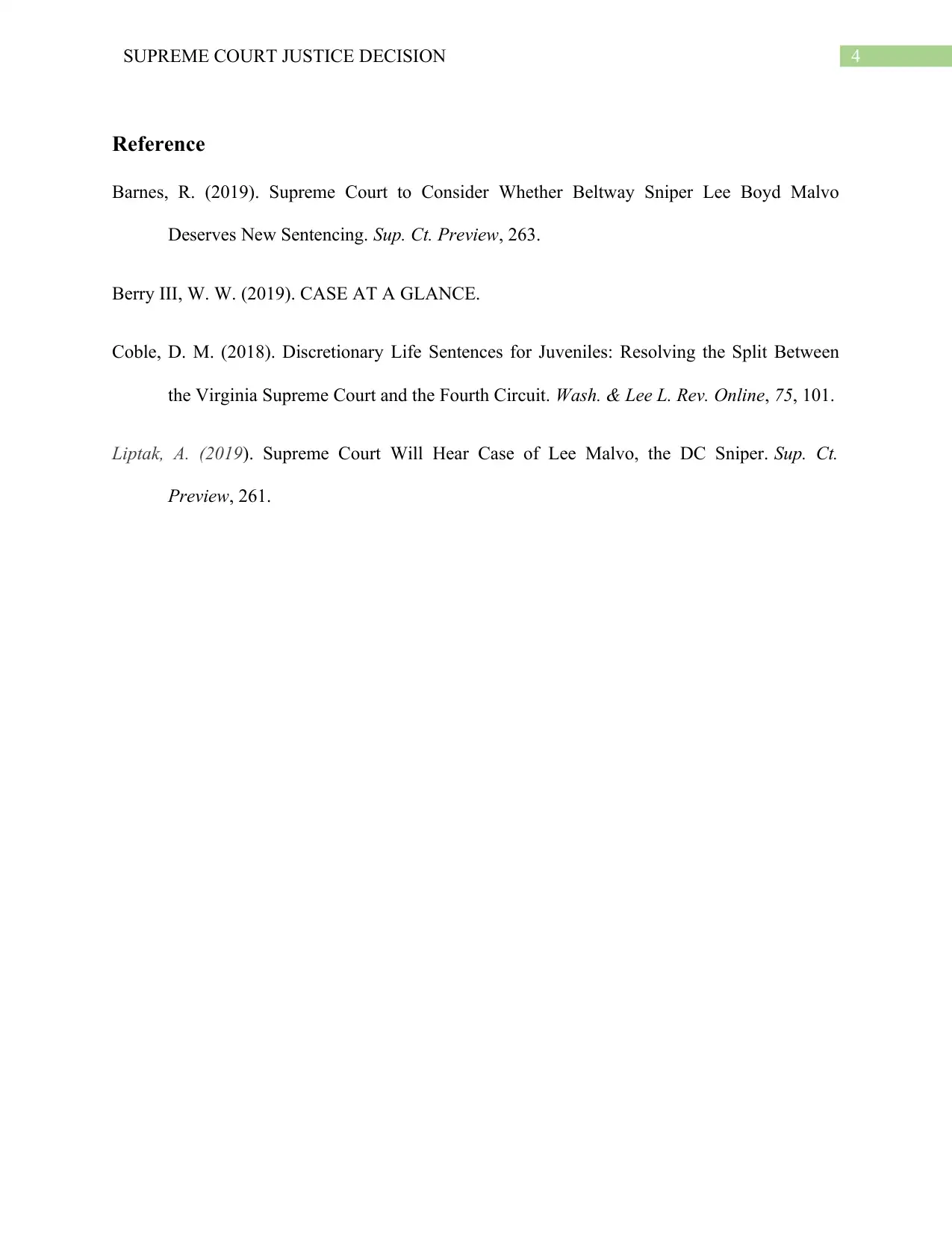
4SUPREME COURT JUSTICE DECISION
Reference
Barnes, R. (2019). Supreme Court to Consider Whether Beltway Sniper Lee Boyd Malvo
Deserves New Sentencing. Sup. Ct. Preview, 263.
Berry III, W. W. (2019). CASE AT A GLANCE.
Coble, D. M. (2018). Discretionary Life Sentences for Juveniles: Resolving the Split Between
the Virginia Supreme Court and the Fourth Circuit. Wash. & Lee L. Rev. Online, 75, 101.
Liptak, A. (2019). Supreme Court Will Hear Case of Lee Malvo, the DC Sniper. Sup. Ct.
Preview, 261.
Reference
Barnes, R. (2019). Supreme Court to Consider Whether Beltway Sniper Lee Boyd Malvo
Deserves New Sentencing. Sup. Ct. Preview, 263.
Berry III, W. W. (2019). CASE AT A GLANCE.
Coble, D. M. (2018). Discretionary Life Sentences for Juveniles: Resolving the Split Between
the Virginia Supreme Court and the Fourth Circuit. Wash. & Lee L. Rev. Online, 75, 101.
Liptak, A. (2019). Supreme Court Will Hear Case of Lee Malvo, the DC Sniper. Sup. Ct.
Preview, 261.
1 out of 5
Your All-in-One AI-Powered Toolkit for Academic Success.
+13062052269
info@desklib.com
Available 24*7 on WhatsApp / Email
![[object Object]](/_next/static/media/star-bottom.7253800d.svg)
Unlock your academic potential
Copyright © 2020–2026 A2Z Services. All Rights Reserved. Developed and managed by ZUCOL.
